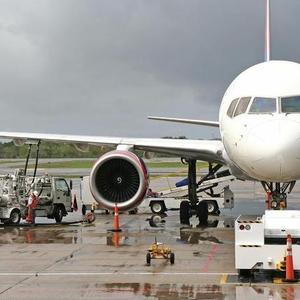KLM to operate biofuel flights out of Los Angeles

September 9, 2016
BY KLM Royal Dutch Airlines
KLM Royal Dutch Airlines has signed a three-year contract for the supply of sustainable biofuel in Los Angeles. This means that KLM will purchase sustainable biofuel for all its flights at this airport for a period of three years. The biofuel will be produced by the local biofuel refinery AltAir Fuels and supplied by SkyNRG. Los Angeles is the world’s second airport that has incorporated biofuel into its regular refueling process. The airport in Oslo, Norway, was first to do so in March this year. KLM was also involved in that initiative.
“Sustainable biofuel is currently one of the most effective ways to reduce CO2 emissions in the airline industry,” said KLM President and CEO Pieter Elbers. “Owing partly to the companies taking part in the KLM Corporate BioFuel Programme, we have been able to take this step, giving a further impulse to the consistent production of biofuel.”
The KLM Corporate BioFuel Programme enables businesses to ensure that sustainable biofuel is used for a portion of their air travel. Participants pay a surcharge that covers the difference in price between sustainable biofuel and regular kerosene. In doing so, they set an example and actively help to make air transport more sustainable. The KLM Corporate BioFuel Programme is partnered by ABN AMRO, Accenture, CBRE Global Investors, FMO, FrieslandCampina, Amsterdam Municipality, Heineken, Loyens & Loeff, PGGM, Perfetti Van Melle, and the Schiphol Group.
Advertisement
Advertisement
The biofuel is pumped directly into the airport fuel reservoirs, which also hold the airport’s conventional kerosene supply. This implies it is delivered into all aircrafts that are refueled in Los Angeles. In this way, biofuel contributes to reducing CO2 emissions from all flights taking off from Los Angeles.
Together with its partners in the KLM Corporate BioFuel Programme, KLM buys sustainable biofuel in Los Angeles and can therefore assign the reduction in CO2 emissions to all KLM flights departing from this airport. These biofuel flights contribute to KLM’s ambition to achieve a 20 percent reduction in CO2 emissions per passenger by 2020 (compared to 2011).
SkyNRG supplies the sustainable biofuel, which is made from used cooking oil by AltAir Fuels in Los Angeles. AltAir Fuels is the first and only refinery in the world that continuously produces biofuel for aviation, making it the first that supplies biofuel to the airline industry on a commercial basis.
Advertisement
Advertisement
Maarten van Dijk, CEO of SkyNRG, said, “We’re extremely proud that only five years after we supplied KLM to operate the first commercial biofuel flight worldwide, our launching customer has now signed its first long-term biofuel offtake. AltAir’s dedicated production capacity marks an important milestone as creating scale is crucial to take the next step in the development of the sustainable jet fuel market.”
Bryan Sherbacow, president of AltAir Fuels, said, “KLM’s multiyear biofuel offtake is a real milestone for the industry and shows their commitment to making aviation more sustainable. We’re proud to supply them together with our project partner SkyNRG.”
KLM is a pioneer in the use of sustainable biofuel and has earned the status of “best in class” in terms of fuel efficiency. In 2011, KLM operated its first commercial flight using biofuel. Since that flight to Paris, numerous KLM flights using sustainable biofuel have been operated by various KLM aircraft types.
Related Stories
Kintetsu World Express Inc. has signed an additional agreement with Hong Kong, China-based Cathay Pacific Airways for the use of sustainable aviation fuel (SAF). The agreement expands a three-year partnership between the two companies.
Broco Energy on July 17 announced a new partnership with the Massachusetts Port Authority (Massport) to deliver and transition Massport's fuel tanks to renewable diesel across its various facilities.
Shell Aviation, Accenture, and Amex GBT on July 10 announced Avelia is in the process of evolving to an industry solution with independent data hosting and a multi-supplier model helping users access the GHG benefits of SAF.
Avia Solutions Group, the world's largest ACMI (aircraft, crew, maintenance, and insurance) provider, has partnered with DHL Express to reduce greenhouse gas emissions from its international shipments using SAF.
Bangkok Airways Public Company Limited has officially announced the adoption of sustainable aviation fuel (SAF) on its commercial flights, reinforcing Thailand’s green aviation industry. The initiative took effect starting July 1, 2025.
Upcoming Events










